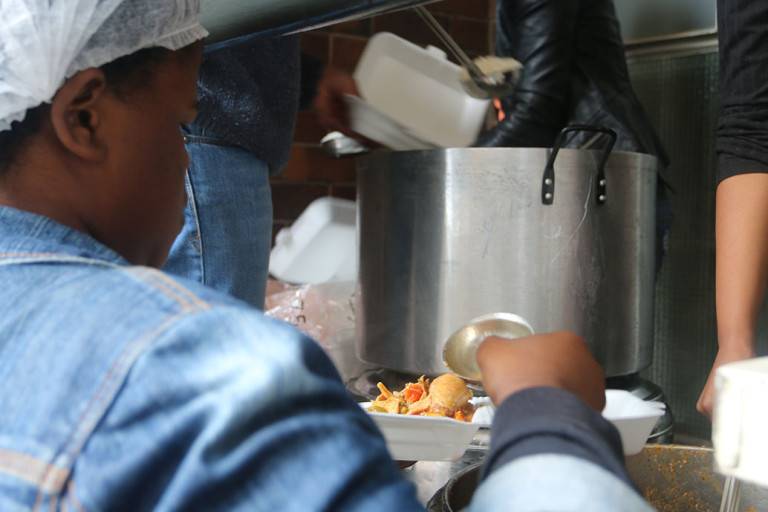
Skipping breakfast to save money for the next meal has been a way of life for some University of Pretoria (UP) students from poor households.
A report compiled by the university’s institutional forum also found that about 40% of their students this year did not know where their next meal would come from, while a University of Witwatersrand (Wits) study in 2012 revealed that poor students scavenged for food from dustbins because they could not afford meals.
The shocking details were revealed at the #FoodTalks seminar held by UP’s Centre for the Advancement of Scholarship (CAS) last week.
The seminar, held at the university’s Old College House Seminar Lounge in Pretoria, focused on student hunger and how to achieve the right to food for all.
The event was organised in collaboration with the department of science and technology, the National Research Fund Centre for Excellence in Food Security, the Centre for the Study of Governance Innovation and the Human Economy Programme within CAS.
*Noxolo Sithembu said she has been skipping breakfast for the past two years.
Sithembu, an undergraduate student at UP, told City Press that while other well-off students were buying breakfast – the most important meal of the day – at the canteen she opted to save her money for lunch and dinner.
She said the National Student Financial Aid Scheme (Nsfas) allocated only R100 for her meals daily and about R14 400 a year.
Nsfas has assisted 378 122 students to pay for meals at universities this year. The scheme also funded 343 754 students at technical and vocational education and training colleges.
“The R100 daily limit is not enough. You get breakfast that costs more than R50 at the canteen. Already, you have to think about lunch and dinner. I can’t even phone my parents and say I need money because I understand that they don’t have any,” she said.
Sithembu said students were also not allowed to cook in the traditional residences, which was the only accommodation she could afford.
Mike Okonko, a postgraduate student from Ghana, said he depended on a friend for meals.
“Sometimes, I get ashamed to ask for more money [for food]. I will sleep hungry and wake up in the morning and go to class without having eaten anything,” he said.
Sithembu and Okonko’s experiences formed part of the discussions at the seminar.
GROWING CONCERN
The seminar was held amid growing concerns in the higher education sector that between 30% and 65% of students at universities could be experiencing food insecurity.
There are also concerns that the hunger impacts on their ability to focus as well as on their physical and mental health and well-being.
While there have not been comprehensive studies, experts believe that the poverty is impacting on the pass rates, with around 50% of students dropping out of university within the first three years.
It was likely that poverty was not only a contributing factor but a dominant one.
In response to some of these issues, in 2016 a group of Wits alumni founded the SA Student Solidarity Foundation for Education (SASSFE), a not-for-profit organisation, to reach out to needy students not only at Wits but at other universities as well.
Tiego Moseneke, SASSFE management committee chairperson, said they encouraged alumni to contribute small amounts of money “reliably and repeatedly” to help poor students access higher education in dignity.
“Our first priority is to banish hunger on our campuses. Hunger is a major problem in our campuses and undermines academic progress,” Moseneke said.
“Over the last three years SASSFE has supported the Wits Food Bank which provides meals to poor students at Wits. SASSFE will do so again next year.
“We encourage alumni to give generously to SASSFE so that we can extend this intervention to other universities,” Moseneke said.
At the UP seminar, students also raised questions about stigma associated with them having to go to halls for free meals.
Speakers also indicated that students were exposed to unhealthy but expensive foods sold by vendors on campuses.
Such food, participants agreed, was expensive and there was a need to allow small-scale farmers and fruit vendors to sell their produce on campuses to mitigate against corporates selling in and outside campuses.
A student asked why food was not offered on campuses the same way books were made available in libraries.
Vishwas Satgar, a Wits University professor, an activist, co-founder and leader of the SA Food Sovereignty Campaign (SAFSC), said a study at Wits in 2012 found that poor students were scavenging from dustbins to get their meals.
The SAFSC was formed by social movements, small-scale farmers, farmworkers and NGOs championing strategies advancing food sovereignty in the country.
Satgar said universities had to find ways to avoid stigmatising needy students, who get free meals. This, he said, could be done by having communal kitchens where everyone – from university staff, academics and students – would enjoy the same meals.
Marc Wegerif, a post-doctoral fellow in the UP Human Economy Programme, said there was a need for a law to be passed that would give effect to the constitutional rights of individuals to healthy food.
Wegerif said not enough was being done by academics to bring the subject of food security into the education system through research.
Universities were also urged to come up with initiatives similar to the Wits Food Sovereignty Centre, which advocates the recreation of food spaces such as food gardens on campuses, where everyone could have access to fresh fruits and vegetables without stigmatising those in need.
Kagisho Mamabolo, Nsfas spokesperson, confirmed the R14 400 a year.
*Not her real name




 Publications
Publications
 Partners
Partners









